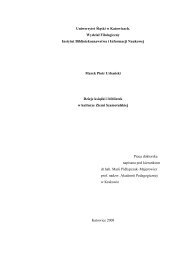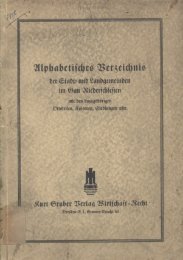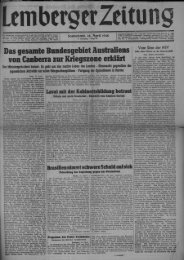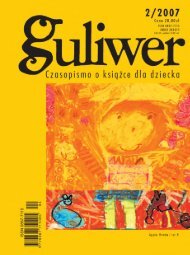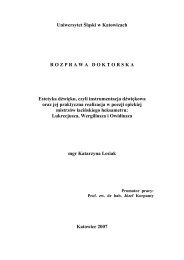Untitled
Untitled
Untitled
Create successful ePaper yourself
Turn your PDF publications into a flip-book with our unique Google optimized e-Paper software.
Sonorant conspiracy129a weak position, the difference being that in (20a) it is neither governednor licensed, while in (20b) it is governed but unlicensed. The reason whythe representation in (20a) is abandoned is the fact that word-final emptynuclei are banned from governing lexically present nuclei. Recall the discussionfrom the previous chapter (section 3.2) where it was pointed outthat alternating vowels are not good governors of other alternating vowels.The same is true for word-final empty nuclei. Thus, given the Polishexamples like sen ‘dream’, len ‘flax’ which possess the alternating vowel inroots sPnu ‘iden. gen.’, lPnu ‘iden. gen.’, respectively, the word-final emptynucleus cannot be granted the ability to govern such root vowels. Were itpossible, we would arrive at roots without any realised vowel, that is, *ln,sn. Such roots are ill-formed not only in Polish but rather cross-linguistically.On the basis of this observation Scheer (2003) proposes the followingrestriction:(21) Final Empty Nuclei may or may not govern; however, they can onlygovern nuclei which are lexically empty.Given the above restriction the representation in (20a) is predicted tobe false. This is because the vowel separating both consonants, i.e. schwa,is lexically present. Furthermore, the nasal in (20b) appears in theworst situation possible: it is unlicensed but at the same time governed(see section 4.3 in Chapter Two). Thus, in order to survive the nasalspreads and displaces the preceding schwa giving rise to the syllabic consonant(22).(22)C|vVCVC|gVCV|PAÉ«®NIn German nasals share this stage with another candidate for syllabicconsonants, that is, the alveolar lateral [l]. The lateral can displace thepreceding schwa and become syllabic in exactly the same way as thenasal in (22). Similarly to the examples in (19), the forms, e.g. Segel ‘sail’,Handel ‘commerce’, Henkel ‘handle’, can be realised with the schwa orwithout it. In the former situation the lateral is not syllabic but becomessyllabic in the latter scenario [ ® zeÉg«l], [ ® hand«l], [ ® hENk«l] and [ ® zeÉg®l], [ ® hand®l],[ ® hENk®l], respectively. However, syllabicity is not the end of the road forthe nasal as it can reach as far as the obstruent to dock on to its place ofarticulation. In this way the nasal creates a structure which is branching;it displaces the preceding schwa and additionally docks on to the9 Polish...



